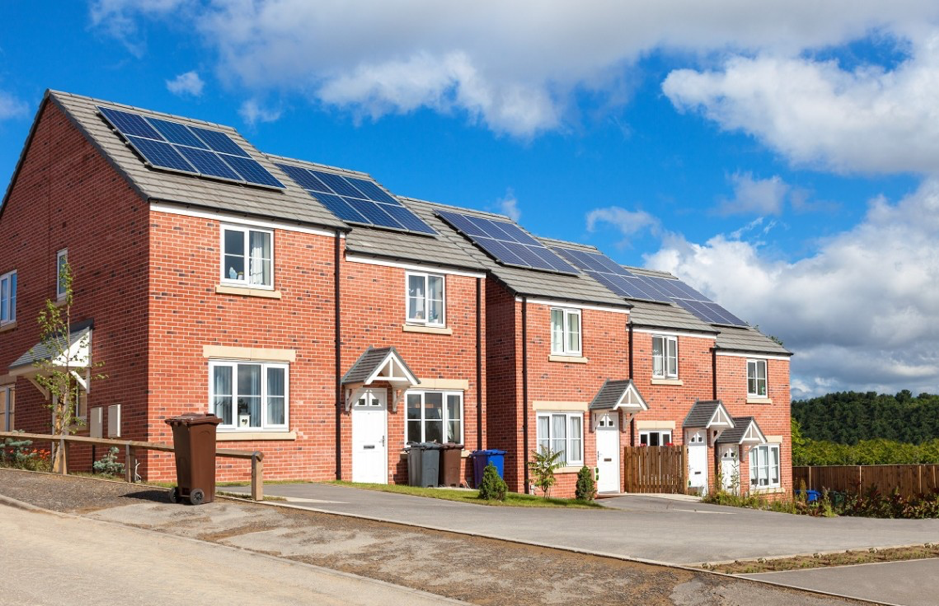Part I: Technology Influencing Sustainability In The Home
- Oran McVeigh-Keeling

- Mar 23, 2020
- 4 min read
Enterprises are not concerned about the sustainability of our planet – or are they? This blog post is not setting out to examine the motives of a company. However, one objective of a business that cannot be questioned is their desire to increase revenue and profit. A study on corporate social responsibility found that 88% of customers will be more loyal to an enterprise that supports social or environmental issues (Butler, 2018)! If such a large cohort of the population wish enterprises to make an impact on the sustainability of the planet, what can people do to make their home more environmentally friendly? This part of the blog will examine the latest technology that can make the family home into a more sustainable home!

Nowadays, newly built houses are well-insulated and commonly have solar panels installed onto the rooftop. This results in houses producing lower energy bills and being more sustainable. There are grants available from the Irish government to improve the insulation or install solar panels into older houses. However even if one was to obtain the grant, the initial investment required to do so is considerable. Thus, it can be deemed as a non-viable option for the majority of households.

Luckily, there is hope yet for the actively seeking sustainable household – the smart technology revolution has arrived! There is now an abundance of smart devices that can commonly be found within the home – from smart speakers to smart fridges. A common characteristic of new smart devices is that they are typically energy efficient! To highlight how a household can indeed make a positive impact to the sustainability of our plant, this blog will focus on three areas:
1) Smart Lighting
Gone are the days when one had to stand up to flick a switch to turn on or off the light. Smart lighting now allows members of a household to do so via an application on their smartphone! Many smart bulbs offer a variety of different colour options or brightness levels. Automated lighting allows one to set schedules for the lights in each specific room. Thus, one can ensure that the lights are indeed turned off when specific rooms are not in use for prolonged periods of time during the day and night. In addition, smart bulbs were found to be 85% more energy efficient than the incandescent light bulb (ElectricIreland.ie, 2014)!

2) Smart Thermostats
Gone are the days when one had to wake up to a cold, chilly house. Smart thermostats maintain the perfect temperature for the members of the household at all times! The market leader within this space is Nest, who were acquired by Google in 2014 for $3.2 billion (Whitney, 2014)! The company have produced a thermostat that learns, constantly updates and reschedules itself as one alters the controls to adjust the heating. It will also learn and take into account how long it takes to heat the house up given the temperature on any given day. This makes it bespoke and personalised for your home! The thermostat is responsible for 60% of a house’s energy bill (Nest.com, 2020). Thus, by implementing a smart thermostat it allows a household to take control of a large proportion of their energy bill from just one device!

3) Smart Plugs & Switches
Lastly, gone are the days when one had to use ‘dumb’ household appliances. Smart plugs can transform ordinary appliances into smart household devices! This can allow one to turn on their kettle or coffee machine via an application on their smartphone – every second of time counts! Also, smart plugs can be purchased for as little as 8 euro in Ikea (Lee, 2018)! With regard to improving the sustainability of a household, smart plugs and switches can be seen as a means of ensuring that all appliances are switched off when not being utilized, such as standard lamps or televisions left on stand-by.

Previously, there was a barrier preventing households from becoming more sustainable because of the substantial investment required to re-insulate a house or install solar panels. There is no doubt that IoT devices, some of which are alluded to within this blog post, have removed that barrier and have allowed households to make a change and become more sustainable. Much of this technology not only has a positive impact on the environment, but also improves the quality of life of the inhabitants! A noteworthy point is that the majority of this smart technology itself does not improve the sustainability of the home. They can be viewed as a means by which the household members can control matters in a more precise and convenient manner. To conclude, a combination of attention and care, and the innovative technology can result in a more sustainable home!
Has technology allowed businesses to be more sustainable? Check out Part II written by my Green Guys colleague Alex Davies!
________________________________________________________________________________
-------------------------------------------------------------------------------------------------
References
[1] Butler, A., 2018.Do Customers Really Care About Your Environmental Impact?. [online] Forbes.com. Available at: <https://www.forbes.com/sites/forbesnycouncil/2018/11/21/do-customers-really-care-about-your-environmental-impact/#75e8a4ec240d> [Accessed 24 March 2020].
[2] De Looper, C. and Pino, N., 2020.Best Smart Home Devices 2020: Get Comfy With Smart Lighting, Heating And More. [online] TechRadar.com. Available at: <https://www.techradar.com/news/smart-home-devices> [Accessed 24 March 2020].
[3] Nest.com. 2020.Energy Bill Savings. [online] Available at: <https://nest.com/eu/savings> [Accessed 25 March 2020].
[4] Lee, D., 2018.You Can Now Purchase Ikea’s Smart Plug. [online] TheVerge.com. Available at: <https://www.theverge.com/2018/11/29/18118357/ikea-smart-plug-echo-google-apple-homekit-tradfri-gateway> [Accessed 25 March 2020].
[5] ElectricIreland.ie. 2014.The Story Of The Light Bulb - Energy Efficient Light Bulbs. [online] Available at: <https://www.electricireland.ie/news/article/the-story-of-the-light-bulb> [Accessed 24 March 2020].
[6] Whitney, L., 2014.Google Closes $3.2 Billion Purchase Of Nest. [online] CNET.com. Available at: <https://www.cnet.com/news/google-closes-3-2-billion-purchase-of-nest/> [Accessed 25 March 2020].
Great content guys. I just realised I need to make my home living a lot more sustainable!